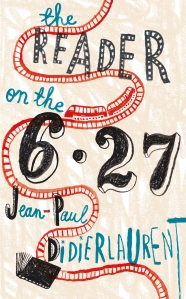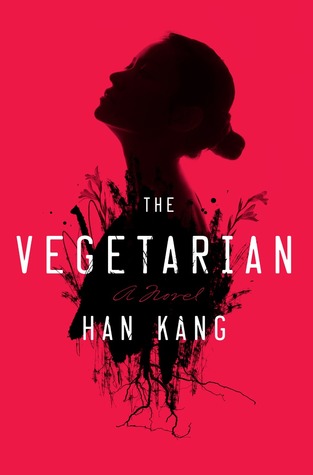After reading what was possibly one of the most harrowing  stories I’ve come across (The Vegetarian is up there in distress ranking, right next to A Little Life), The Reader on the 6.27 seems like a breath, no, a gulp of fresh air under the mild winter sun, the breeze slapping ever so slightly against your cheeks, a stark contrast to the stifling hot room you’d been locked in, accompanied by a heating system that provided warmth at the expense of immense discomfort and congestion. Yes, this delightful book is all rainbows and sunshine, heartwarming and soothing, none too cheesy but lighthearted humor poised against the vibrancy of plot & vitality of characters.
stories I’ve come across (The Vegetarian is up there in distress ranking, right next to A Little Life), The Reader on the 6.27 seems like a breath, no, a gulp of fresh air under the mild winter sun, the breeze slapping ever so slightly against your cheeks, a stark contrast to the stifling hot room you’d been locked in, accompanied by a heating system that provided warmth at the expense of immense discomfort and congestion. Yes, this delightful book is all rainbows and sunshine, heartwarming and soothing, none too cheesy but lighthearted humor poised against the vibrancy of plot & vitality of characters.
- As for Guylain Vignolles, he began his life encumbered only by his name, which lent itself to an unfortunate spoonerism: Vilain Guignol – ugly puppet – a bad pun that rang in his ears from the moment he first drew breath, and quickly stuck
- His aim was to be neither good-looking nor ugly, neither fat nor thin. Just a vague shape hovering on the edge of people’s field of vision. To blend into his surroundings until he negated himself, remaining a remote place never visited. During all those years, Guylain Vignolles had spent his time quite simply not existing, apart from on this dismal station platform where he stood every weekday morning.
- There was something symbolic about the act of lowering his seat that he found reassuring
- The string of intestines slithered out, as if impatient to leave the ribcage where they had been confined
- The first mouthfuls were always tricky. The Zerstor was a temperamental ogress. She sometimes became congested, victim of her own greed. Then she would stall, in the midst of chomping, her mouth full to bursting.
- This morning, the Thing had got off on the right piston. It snapped up and gobbled its first ration of books without the slightest hiccup. Only too happy to crunch something other than air, the hammers were having a field day. Even the noblest spines, the sturdiest bindings, were crushed in seconds
- I remain your servant, yet hardly need to state That within this precinct, I’m master of your fate.’
- Guylain had always seen Yvon apply this principle, which consisted of never stopping midsentence, for any reason whatsoever. Never lose the thread of the Word, kiddo! Go right to the end; glide through the speech until the final full stop releases you
- he would sit down opposite him and gently take his friend’s hands, two warm dying birds that meekly allowed themselves to be caught
- time acted on books like ice on buried stones and that sooner or later they would surface
- The old boy’s beady little eyes read all that in his silence. ‘I’ve made some food for you.’ His peremptory tone left Guylain no option but to accept the invitation. When Giuseppe cooked, it was the whole of Italy that landed on your plate. After
- Rouget and he had spent their day going round in circles, the fish in his bowl, and he in his studio flat, already filled with dread at the thought of Monday
- Counting was the best way he had found to stop himself from thinking about the rest. He counted anything and everything. One day the manholes, another the parked cars, the dustbins or entrances to buildings. The road had no more secrets from him. He sometimes even counted his own steps
- everything would be fine, that striking up a conversation was the hardest bit and afterwards the words would come all by themselves, that there was no need to be afraid
- It is in the scars on the faces of the veterans that you can see wars, Julie, not in the photos of the generals in their starched, freshly pressed uniforms
- I’m still dreaming of a warmer, rounder number, a more visually appealing number. A number containing a few nice bulbous zeros, even some deliciously plump eights, sixes or nines. A curvaceous three, as ample as a wet nurse’s bosom, would be enough to make me happy. A number like 14,717, is all bones. It exposes its skinniness directly, assails your retina with its sharp angles. Whatever you do, once written down, it always remains a series of fractured straight lines. It would only take one tile more or less to give that unappealing number the beginnings of an attractive curve.
- After a few recommendations on the importance of a healthy diet, the doctor scribbled his verdict at the bottom of the file. It was summed up in three words – three little words that entitled Guylain to continue the massacre with impunity: Fit for work.
- I quickly had to come to terms with the fact that people generally expect only one thing of you: that you reflect back the image of what they want you to be
- He inquired about a new bowl too. ‘Spherical or rectangular?’ asked the assistant. Cruel dilemma to have to choose between a deadly monotonous circular path or a halting circuit that’s all sharp angles. In the end he opted for the usual glass globe. Even for the most common of fish, there could be no worse ordeal than constantly banging into corners.
- Rouget de Lisle V had died during Guylain’s absence. He found the fish’s little body lying next to the bowl when he came home from Magnolia Court. His replacement aquarium must have felt too narrow for him to be able to stretch his fins properly and Rouget had preferred to take the great leap into the unknown, to find out whether the world wasn’t better elsewhere
- From experience, he knew that there was a vast difference between living alone and living alone with a goldfish
- So with no script and no other safety net than his phenomenal memory, Yvon Grimbert, alias Vernon Pinder, subjected the ears of the astounded audience to a first blast
- Yes, he knew. It just indicated where the toilets were and didn’t spell out ‘Welcome to Julie, the lavatory attendant’s place’.
- My worldly goods amount to a goldfish called Rouget de Lisle, and my only friends are a legless cripple who spends his time searching for his limbs, and a versifier who only speaks in alexandrine.
- Today, curiously, the tinkle of the coins in my china saucer sounded different, the hours sped by, the neon light was warmer, and even the people seemed nicer than usual
